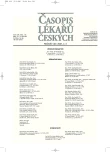Endocrine Orbitopathy and Significance of Autoantibodies Against 1D Protein
Endokrinní orbitopatie a význam autoprotilátek proti 1D proteinu
Východisko.
Endokrinní orbitopatie je chronické oční onemocnění, charakterizované zánětem v parabulbárním a retrobulbárním prostoru a obvykle se vyskytuje u Gravesovy–Basedowovy tyreotoxikózy. Přestože patogeneze onemocnění není doposud zcela objasněná, je akceptováno, že se jedná o autoimunitní onemocnění, kdy cílem autoimunitní reakce jsou antigeny společně sdílené štítnou žlázou a tkání orbity. Pro diagnózu endokrinní orbitopatie jsou vysoce specifické a senzitivní autoprotilátky proti rekombinantnímu 1D proteinu.
Metody a výsledky.
Cílem práce bylo prokázat, zda jsou autoprotilátky proti 1D proteinu převážně nalézány u pacientů s klinicky vyjádřenou endokrinní orbitopatií. U 30 pacientů s klinicky vyjádřenou endokrinní orbitopatií jsme hodnotili tloušťku tří retrobulbárních očních svalů, postižených u endokrinní orbitopatie, stanovovali jsme parametry tyreoidálních hormonů a autoprotilátky proti receptoru tyreotropního hormonu. U všech pacientů jsme detekovali cirkulující autoprotilátky proti rekombinantnímu 1D proteinu. Autoprotilátky proti rekombinantnímu 1D proteinu jsme prokázali u všech pacientů s klinicky vyjádřenou endokrinní orbitopatií.
Závěry.
Imunoreaktivita nezávisela na délce trvání nebo závažnosti oční choroby ani na věku pacientů. Nenalezli jsme žádnou korelaci mezi tloušťkou očních svalů a titrem autoprotilátek proti receptoru tyreostimulačního hormonu, hladinami tyreostimulačního hormonu a volného tyroxinu a žádnou korelaci mezi tloušťkou očních svalů a dobou trvání nemoci.
Klíčová slova:
autoprotilátky, endokrinní orbitopatie, Gravesova–Basedowova tyreotoxikóza, oční sval, 1D protein.
Authors:
P. Hrdá 1,3; I. Šterzl 1,3; S. Váňa 1; Z. Novák 1; P. Matucha 1; A. Kromminga 2
Authors‘ workplace:
Endokrinologický ústav, Praha
1; Institute for Immunology, Pathology and Molecular Biology (IPM), Hamburg, Německo
2; Ústav imunologie a mikrobiologie 1. LF UK a VFN, Praha
3
Published in:
Čas. Lék. čes. 2007; 146: 273-277
Category:
Original Article
Overview
Background.
Endocrine ophthalmopathy is a chronic eye disease, characterized by inflammation in parabulbar and retrobulbar space, occurring usually in Graves’ thyrotoxicosis. Although the pathogenesis of the disease has not been clarified until now, it is accepted that this disease is of an autoimmune nature, where the targets of the autoimmune reaction are the antigens shared by thyroid and orbit-tissue. The autoantibodies against recombinant 1D protein are highly specific and sensitive for the diagnosis of endocrine orbitopathy.
Methods and Results.
The aim of our study was to establish, whether the autoantibodies against 1D protein are found predominantly in patients with clinically expressed endocrine orbitopathy. We evaluated in 30 patients with clinically expressed endocrine orbitopathy the thickness of the three retrobulbar eye muscles, damaged by endocrine orbitopathy, determined the parameters of thyroid hormones and anti - TSH receptor autoantibodies. In all patients the detection of circulating autoantibodies against recombinant 1D protein was performed. Autoantibodies against recombinant 1D protein were found in all patients with clinically expressed endocrine orbitopathy.
Conclusions.
Immunoreactivity did not depend on the duration or severity of the eye disease, neither on patients’ age. We did not find any correlation between the thickness of eye muscles and the titre of anti - TSH receptor autoantibodies, levels of ssTSH and free thyroxine and also any correlation between the thickness of eye muscles and the disease duration.
Key words:
autoantibodies, endocrine ophthalmopathy, Graves’ disease, eye muscle, 1D protein.
Labels
Addictology Allergology and clinical immunology Angiology Audiology Clinical biochemistry Dermatology & STDs Paediatric gastroenterology Paediatric surgery Paediatric cardiology Paediatric neurology Paediatric ENT Paediatric psychiatry Paediatric rheumatology Diabetology Pharmacy Vascular surgery Pain management Dental HygienistArticle was published in
Journal of Czech Physicians

- Advances in the Treatment of Myasthenia Gravis on the Horizon
- Possibilities of Using Metamizole in the Treatment of Acute Primary Headaches
- Metamizole at a Glance and in Practice – Effective Non-Opioid Analgesic for All Ages
- Metamizole vs. Tramadol in Postoperative Analgesia
- Spasmolytic Effect of Metamizole
-
All articles in this issue
- The Polycystic Ovary Syndrome and Its Male Equivalent
- Polyglandular Activation of Autoimmunity as a Manifestation of Subclinical Endocrinopathies
- Evaluation of Results of Iodine Prophylaxis in Czech Republic
- Diabetes Mellitus in Adult Patients with Type 1 Diabetes Shows Immunological, Functional and Clinical Differences Depending on the Presence of Autoimmune Thyroiditis
- Endocrine Orbitopathy and Significance of Autoantibodies Against 1D Protein
- Influence of Early Postnatal Nutrition in Preterm Infants on Their Anthropometric and Hormonal Characteristics at the Age of 10 Years
- Relationships Between the „Eating Inventory“ Factors, Socioeconomic Status, Anthropometric Body Adiposity Indexes and Health Risks in Czech Population
- Levels of Hormones in Plasma and in Synovial Fluid of Knee Joint of Patients with Rheumatoid Arthritis
- The Institute of Endocrinology Celebrates its 50th Anniversary. How is the Institute Poised for the Next 50 Years?
- Half Century of the Continuation of the Institute of Endocrinology in Prague
- History, Presence and Trends of Steroid Endocrinology
- Study of the Genetic Causes of Polygenetically Determined Endocrinopathies – Patience Can Bring Success
- Growth Hormone Treatment in the Institute of Endocrinology
- The Role of Complement in Autoimmune Thyroid Disorders
- Quality of Life in the Patients with Disorders of Sexual Development and with Y Chromosome in Karyotype
- Polycystic Ovary Syndrome in 2006
- Neurosteroids and Their Function
- Regulatory Network of Transcription Factors: Their Key Role in the Development and Function of Pancreas
- Genetic Background of Mitochondrial Diabetes
- Obesity Based on Mutation of Genes Involved in Energy Balance
- Osteoporosis and Aterosclerosis – is there Any Pathogenetic Association?
- Journal of Czech Physicians
- Journal archive
- Current issue
- About the journal
Most read in this issue
- Neurosteroids and Their Function
- Relationships Between the „Eating Inventory“ Factors, Socioeconomic Status, Anthropometric Body Adiposity Indexes and Health Risks in Czech Population
- Obesity Based on Mutation of Genes Involved in Energy Balance
- Growth Hormone Treatment in the Institute of Endocrinology
